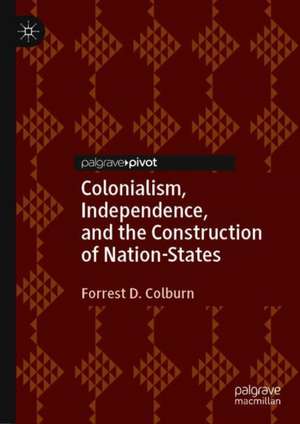Colonialism, Independence, and the Construction of Nation-States
Autor Forrest D. Colburnen Limba Engleză Hardback – 30 sep 2020
Preț: 418.45 lei
Nou
Puncte Express: 628
Preț estimativ în valută:
80.07€ • 85.62$ • 66.76£
80.07€ • 85.62$ • 66.76£
Carte tipărită la comandă
Livrare economică 18 aprilie-02 mai
Preluare comenzi: 021 569.72.76
Specificații
ISBN-13: 9783030547158
ISBN-10: 3030547159
Pagini: 154
Ilustrații: IX, 154 p. 17 illus.
Dimensiuni: 148 x 210 mm
Greutate: 0.35 kg
Ediția:1st ed. 2021
Editura: Springer International Publishing
Colecția Palgrave Macmillan
Locul publicării:Cham, Switzerland
ISBN-10: 3030547159
Pagini: 154
Ilustrații: IX, 154 p. 17 illus.
Dimensiuni: 148 x 210 mm
Greutate: 0.35 kg
Ediția:1st ed. 2021
Editura: Springer International Publishing
Colecția Palgrave Macmillan
Locul publicării:Cham, Switzerland
Cuprins
Chapter 1. Introduction. - Chapter 2. European Imperialism and the Remaking of the World. - Chapter 3. Emancipation and the Quest for “Development”. - Chapter 4. Good-bye to the “Third World”. - Chapter 5. Asia Looms over Latin America, Africa, and the Middle East. - Chapter 6. Captive to Commodities. - Chapter 7. Nicaragua as a Sobering Illustration. - Chapter 8. Seeking a New Compass.
Notă biografică
Forrest D. Colburn is a Professor in the Department of Political Science, Graduate Center, City University of New York, New York, USA.
Textul de pe ultima copertă
‘Why have some poor countries remained “underdeveloped,” or even “failed,” while others have become richer and stronger? In the successful group, have a few—notably China—enhanced methods long used by European imperialists to extract national resources from weaker countries? Has solidarity among poor countries ended? What does the future hold for poor countries? For compelling answers to these questions, read Colburn’s Colonialism, Independence, and the Construction of Nation-States.’
– Lynn T. White III, Professor, Princeton University, New Jersey, USA
‘Colburn’s Colonialism, Independence, and the Construction of Nation-States is both an enlightening and enjoyable read. It is wide-ranging yet enlivened by telling examples.’
– Michael Doyle,Professor, Columbia University, New York, USA
‘Forrest Colburn’s Colonialism, Independence, and the Construction of Nation-States is in part, and most significantly, a welcome attempt to revisit the history of basic ideas from the past, that should not have been shelved. Development, Third World, colonialism, North-South, are notions that surfaced in the sixties and seventies, and faded under the influence of excessive enthusiasm for “emerging markets” in the new century. Colburn explains splendidly why the history of these notions, and their content, is more relevant than ever.’
– Jorge Castañeda, Former Foreign Minister of Mexico, and Professor, New York University, New York, USA
This book analyzes how the poorer countries of the world have a shared history: these many countries were assaulted, overrun, and sometimes even formed by European colonialism. The wave of accessions to legal independence in the aftermath of World War II was of extraordinary importance. There was an intoxicating confidence and determination, a sense that everything was possible. A half-century later, the world looks different. The author adroitly delineates the uneven performance of newly-constructed or reimagined nation-states, and the shifting perceptions of the poorer countries in the world.
Forrest D. Colburn is a Professor at the City University of New York, New York, USA.
– Lynn T. White III, Professor, Princeton University, New Jersey, USA
‘Colburn’s Colonialism, Independence, and the Construction of Nation-States is both an enlightening and enjoyable read. It is wide-ranging yet enlivened by telling examples.’
– Michael Doyle,Professor, Columbia University, New York, USA
‘Forrest Colburn’s Colonialism, Independence, and the Construction of Nation-States is in part, and most significantly, a welcome attempt to revisit the history of basic ideas from the past, that should not have been shelved. Development, Third World, colonialism, North-South, are notions that surfaced in the sixties and seventies, and faded under the influence of excessive enthusiasm for “emerging markets” in the new century. Colburn explains splendidly why the history of these notions, and their content, is more relevant than ever.’
– Jorge Castañeda, Former Foreign Minister of Mexico, and Professor, New York University, New York, USA
This book analyzes how the poorer countries of the world have a shared history: these many countries were assaulted, overrun, and sometimes even formed by European colonialism. The wave of accessions to legal independence in the aftermath of World War II was of extraordinary importance. There was an intoxicating confidence and determination, a sense that everything was possible. A half-century later, the world looks different. The author adroitly delineates the uneven performance of newly-constructed or reimagined nation-states, and the shifting perceptions of the poorer countries in the world.
Forrest D. Colburn is a Professor at the City University of New York, New York, USA.
Caracteristici
Investigates studies on colonialism and anti-colonialism from Africa, the Middle East, Asia, and Latin America. Traces how the colonial systems in the Global South fell apart, especially those of the second-generation. Appeals to the academics, researchers, and students in the fields of comparative politics, development studies, government, and economics.
